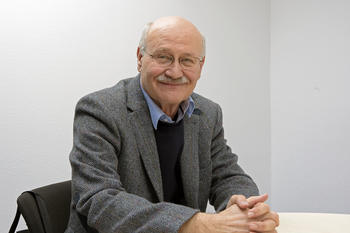“The German students saved my soul”
Douglas Nygren spent the 1967/68 academic year as an exchange student at Freie Universität, which was a hotbed of political activism at the time. Nearly 50 years later, Nygren, an American citizen, returned to Berlin – for good.
Dec 15, 2016
After retiring, Douglas Nygren moved back to Berlin – the city he had gotten to know and experience during an especially turbulent period.
Image Credit: Jonas Huggins
“AMI go home”: The United States wasn’t very popular with the student body 50 years ago. The archive of Freie Universität documents the political scene at the time.
Image Credit: Jonas Huggins
He wanted to be able to read Kafka in the original, and he loved Beethoven and Bach. When Douglas Nygren, a student at the University of Minnesota, applied for a scholarship to study at Freie Universität for a year, he wanted one thing above all: to learn German. During his year abroad, in 1967/68, he did in fact learn a great deal about Georg Büchner.
He also took language classes and played piano at the Julius Stern Institute, which is now part of Berlin University of the Arts. But, Nygren says, politics overshadowed everything at the time, giving him no respite even far from home: “It was the Vietnam War every day. You would have had to be blind and deaf not to notice how much upheaval there was.”
The United States was unpopular with many at Freie Universität for its role in the war, he recalls. Nygren tried to blend in, working to lose his accent and going without American undershirts. Instead, he wore a shirt and turtleneck sweater like his German fellow students. He wanted people to get to know him first without bias before they learned his nationality. At the Schlachtensee student housing complex, he and his German counterparts cooked together, went to the movies, or went out dancing. During the semester break, Nygren bought a car. He and a friend drove it through Austria, Yugoslavia, Greece, and Bulgaria, all the way to Istanbul – and back. Another trip took him to Moscow. Some of his friendships from his days as a student in Berlin have lasted right up to the present day, he says.
Every day he spent in Berlin back then, he faced the Vietnam War, Nygren explains. “There was a student in my building who told me every week what had happened in Vietnam,” he says. “He said it in English so I would really understand it: ‘A hundred and nine American boys died last week. What are you going to do when it’s time for you to go?’”
A Formative Year
Nygren says his year in Germany was a highly formative experience for him. He attended lectures given by Eberhard Lämmert, who went on to become the president of Freie Universität, and by Peter Szondi, the namesake of the present-day Institute of Comparative Literature at Freie Universität. Back in Minnesota, Nygren wrote his bachelor’s thesis on alienation in the works of Georg Büchner. He still has a vivid interest in the German language and German history today. But the very most formative part of the experience, Nygren recalls, was the political discussions he engaged in each and every day at Freie Universität.
Fighting War with Hunger
When he returned to the United States, the Vietnam War had grown more intense, and the risk of being drafted had risen sharply, Nygren says. He participated in protest marches and wanted to avoid the war at all costs. A few months after returning to the U.S., he stopped eating. He kept to a starvation diet for about 13 months, at the end of which he weighed one-third less than he does today. “I tried to make myself as unappealing to the government as possible,” Nygren says.
His plan was a success: during his physical he was found unfit to serve. Going hungry wasn’t the easiest way out, Nygren says today. He could have gotten out of the draft for religious reasons, too. “But that would have been a lie,” he says. “I’m not a pacifist. I would have gone to war against Hitler.”
Return after 50 Years
His political views had changed, and so had his professional goals. Instead of staying at the university after completing his master’s degree in German language and literature at Harvard and teaching German, he embarked on a career as a journalist. “I did it to uncover the Nixon government’s lies,” he explains. He later went back to school to study social work and became a child and youth therapist. He stuck with this profession for 30 years. Nygren is now retired – and he has moved back to Berlin. He continues to play the piano, and he is working on writing some short stories in German. He is still fascinated by the language.
The German students, he says today, may have saved not only his life, but also his soul. One of his German fellow students at the time started confronting his own father with his past during the Nazi era. Nygren is still working on coming to grips with the past. He explains that he asked himself, “What would I tell my children if they asked, ‘What did you do during the Vietnam War?’” Today – his youngest daughter is currently enrolled in a master’s degree program – he says he could answer with a clear conscience.
This text was originally published in German on December 4, 2016, in the campus.leben online magazine by Freie Universität Berlin.


